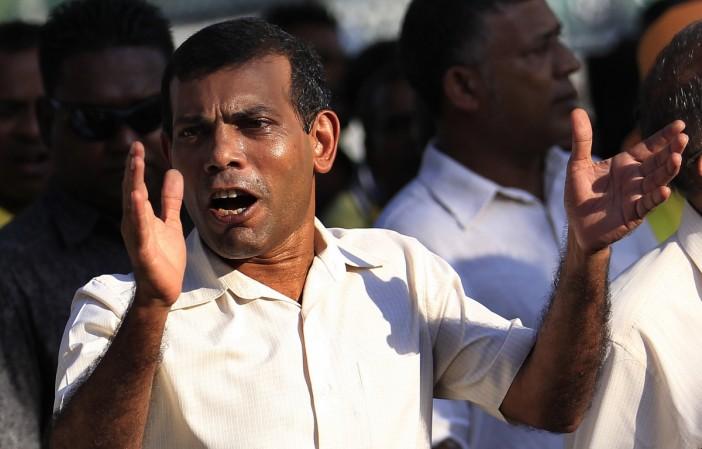
What are India's options in Maldives? Is this the right moment for India to 'liberate' the hugely important swath of the Ocean from the tightening Chinese grip? Maldivian opposition has openly called for New Delhi's military intervention but India doesn't seem to be in a hurry.
Surely India isn't a lily-livered debutant on the international diplomatic stage. It is known to have taken tough calls -- in Sri Lanka and Nepal in recent times -- whenever regional equations demanded strong-arm tactics.
With domestic ire over the heavy-handed rule of President Abdullha Yameen on the rise and with practically no international support for him, it's an easy task for Indian to force a regime change. However, India appears to be waiting on the sidelines. Or rather, is it a case of 'willing to strike but afraid to wound'? President Yameen's audacious refusal to leave and his bid to run through whatever is left of the country's democratic institutions betrays only one factor -- very strong levels of Chinse support for him.
A military route to resolution in Maldives will certainly rankle nerves in China, which is too deeply invested in Maldives to meekly take an Indian military overture.
Regime change in Sri Lanka
India's role in the unexpected defeat of Sri Lankan strongman Mahinda Rajapaksa in the 2015 election has never been a classified secret. Rajapaksa's downfall came after he took his country to the Chinese stable. Sri Lanka's gravitation to the Chinese fold was blatant during Rajapaksa's regime and things came to a head when he allowed Chinese warships to dock without letting India know under treaty obligation.
When the elections were held in 2015 Rajapaksa realised how costly a mistake it was to rub India on the wrong side. International news agencies had reported how the Research and Analysis Wing (RAW) worked through the fragmented and fractious opposition and how it was successful in fielding a consensus candidate, Maithripala Sirisena.
India's undercover operation focused on opposition figures like Ranil Wickremesinghe and Chandrika Kumaratunge and it made sure the Opposition in discord united under him. The symbolism that followed Sirisena's victory was equally important. Hours after the election win, Sirisena met the Indian envoy, while the meeting with the Chinese ambassador had to wait almost a week.
The Nepal connundrum
The same recurring theme had played out in Nepal as well in 2016, when Prime Minister KP Oli was ousted and former PM Prachanda came to power. Oli had incurred India's wrath by cozying up to China and diplomatic circles were abuzz with chatter about India's deft moves that brought his downfall. When Prachanda came to power, he chose to visit India first in a clear departure from his earlier pro-China posturing. In his previous term he had snubbed India by visiting China first after taking power.
It's a different story altogether, that Sirisena eventually capitulated to Chinese influence under heavy indebtedness and ceded control of the key Hambantota port. It's also different story that Oli is about to form a government again in Nepal after the Left alliance led by him won the elections.
In Maldives, history has presented India with another opportunity. The political crisis is boiling over in the archipelago, which is just 700 km from India's shores. The autocratic president has defied a court order to release political prisoners and in turn got two supreme court justices arrested. His political rivals have openly called for India's intervention -- that's military intervention, nothing less.
Operation Cactus
"On behalf of Maldivian people we humbly request: India to send envoy, backed by its military, to release judges & pol. detainees... We request a physical presence," exiled ex-president Mohammed Nasheed said in a tweet. Former strongman Maumoon Abdul Gayoom, who ruled the country for 30 years with Indian support, is in detention along with some family members and key political associates.
Indian military is prepared to move into a swift action mode anytime the political go-ahead arrives. India has warships in the region and the IAF's C-130 Super Herculese aircraft and C-17 transporters can take truckloads of men and material to Maldives in no time. Military operation in Maldives is nothing new for India. The 'Operation Cactus' in 1988 was approved by Rajiv Gandhi to help Maumoon Abdul Gayoom quell a coup attempt.
However, at that time Maldives hadn't emerged as a theatre of China-India proxy war.

















